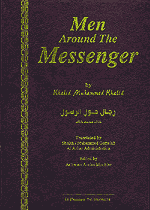Men Around The Prophet

Translator's Preface
While reading this book, we cannot help but be moved by the lives of the Companions herein depicted. How we long to have their awe and reverence for Allah! How we long to spend the same hours in worship as they! How we long to be as brave as they were in the face of danger! How we long to be as patient as they were under torture!
Narrated `Abd Allah (May Allah be pleased with him): The Prophet (PBUH) said, "The best people are those living in my generation, and then those who will follow them, and then those who will follow the latter. Then there will come some people who will bear witness before taking oaths, and take oaths before bearing witness." (Bukhaarii)
It is our hope that this book will fulfill a need for the English speaking Muslim to learn more about that first generation of Muslims. Indeed the Companions - those men and women who were contemporaneous with the Prophet Muhammad (PBUH) -- inspire and encourage us. Read these stories and share them with your children, for these Companions are a part of our Islamic heritage that will,Allah willing, strengthen us as a nation if we try to follow their examples.
Enough said for the reason for choosing this book to translate, for the book stands on its own merit. Let us explain our reasons for some choices within the translation.
The translator is always faced with the question of how to transliterate Arabic names and whether to translate or transliterate Islamic terms. The reader may find the spelling of names in this book different than he or she is accustomed to. That is because we have chosen to transliterate as closely to the Arabic pronunciation as possible, believing that the English-speaking Muslim should make an effort to pronounce the names correctly. Lacking diacritic marks, we have transliterated the long vowels with double vowels, which should not confuse the reader. Please refer to the notes on transliteration which follow.
An exception to this is the spelling of some places names. If there is an English form of a name available, this has been used instead of a transliterated Arabic name.
As for Islamic terms, we felt that most of the terms left in the Arabic would be familiar to the Muslim reader, and they have not been italicized as foreign terms although, as noted above, their spelling may not be the usual one. Many of these words have been incorporated into the English language and may be found in many dictionaries, although the Muslim reader is not always satisfied with the dictionary's definition. Therefore, a glossary has been provided for those words which may not be familiar to all readers.
Number within parentheses refer to surah and verse of the Holy Qur'an.
Many thanks to those who helped in the translation, revision, editing and typing of this text: Dr. Ahlam Fathy, Dr. Amany Abu Al-Fadl, Mona Yunus, Raw'ah Al-Khateeb, Amal Abu Sitah, Dr. AbdulKarim Kamara, Professor `Umar Abdul Hakeem, Michael White and Nariman Ezz.
May Almighty Allah accept this work, and may we and all those who participated in the preparation of this text be accepted into the presence of the Most High on the day when nothing, neither wealth nor children, will be useful.
